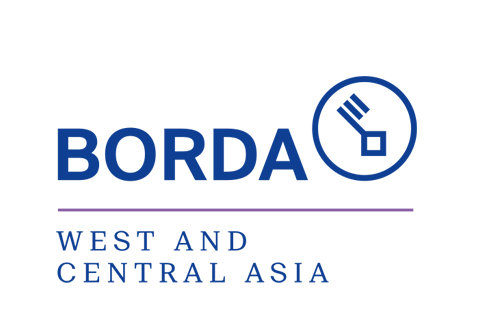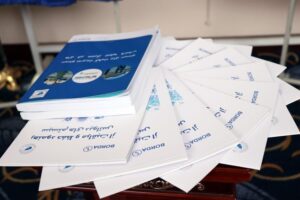DWATS as Climate Adaptation for Agriculture in Jordan

Decentralised Wastewater Treatment Systems (DWATS) as a Climate Change Adaptation Option for Agriculture in Jordan
Reducing Smallholder Farmers' Vulnerability to Drought and Food Insecurity
Intervention Logic
The proposed intervention aims to address the gaps in market, technology, and financial assessments to accelerate the adoption of decentralised wastewater treatment systems (DWATS) as a non-conventional water source in Jordan. This initiative aims to enhance the resilience of vulnerable smallholder farmers to climate risks and food insecurity. It takes a cross-sectoral approach involving stakeholders such as smallholder cooperatives, private and public financial institutions, and technology providers. Outputs include a market assessment, DWATS options analysis and sustainable financial models. Activities involve surveys, consultations, and partnerships.
The intervention is in direct alignment with Jordan’s Nationally Determined Contributions (NDC), particularly the Climate Change Policy for a resilient water sector. By promoting an integrated DWATS approach, the intervention supports the NDC’s objectives of building resilience in Jordan’s water sector in response to climate change. It also aligns with several Sustainable Development Goals (SDGs), including Goal 2 (Zero Hunger) by enhancing food security through sustainable irrigation, Goal 6 (Clean Water and Sanitation), and Goal 13 (Climate Action) by mitigating climate change impacts on agriculture. It directly supports the UN’s Water Reuse Policy by advocating for treated wastewater for agricultural irrigation. It addresses societal concerns around wastewater reuse, ensuring the safety and acceptability of the practice among farmers and consumers. It embraces the UNDP Climate Change Adaptation Framework by adopting an approach to enhance climate resilience. It not only addresses vulnerabilities but also contributes to sustainable development, echoing the UNDP’s emphasis on integrated, nature-based solutions for climate adaptation.
Intervention Components
Outcome 1: Market Assessment of Smallholders in North Jordan for DWATS
Conducting a comprehensive market feasibility assessment in areas with high to medium climate change drought vulnerability. This will identify agricultural areas not connected to sewage networks, assess baseline irrigation practices, crop types, financial profiles of smallholder farmers, and potential for clustering groups of farming communities.
Outcome 2: Integrated DWATS Options Analysis
Performing an in-depth assessment of DWATS technology options for the identified market potential. This will include standardized DWATS designs with cost-benefit analysis, potential for clustering and scaling-up individual sites, operation & maintenance models, and assessment of co-mitigation benefits such as biogas production.
Outcome 3: Identification of Sustainable Business Models for DWATS operation
Developing DWATS operational business models based on the outputs from market assessment and technology options analysis. The proposed models will consider existing market regulations in Jordan and aim at attracting public sector investment for sustainable DWATS solutions.
Implementation Plan
Outcome 1: Market Assessment of Smallholders in North Jordan for DWATS
Activity Description
This activity involves a meticulous examination of the market dynamics pertaining to smallholder farmers in North Jordan, specifically focusing on the feasibility and adoption potential of Decentralized Wastewater Treatment Solutions (DWATS). The goal is to assess the specific needs, challenges, and opportunities within the targeted region, with a keen emphasis on decentralized wastewater treatment as a sustainable solution. Engaging with local stakeholders and communities will be crucial to understanding the unique contextual factors influencing the adoption of DWATS in the agricultural sector. The assessment will encompass evaluating the existing wastewater management practices, gauging the willingness of smallholders to embrace decentralized solutions, and identifying potential barriers and enablers.
The culmination of the activity will be a comprehensive market assessment report. This report will encapsulate the findings, analyses, and insights gathered throughout the assessment process. It serves as the primary document that consolidates all relevant information, presenting a thorough understanding of the market dynamics, challenges, opportunities, and feasibility aspects related to the adoption of Decentralized Wastewater Treatment Solutions (DWATS) among smallholder farmers in North Jordan. The report will provide a valuable resource for decision-makers, stakeholders, and project planners to formulate informed strategies and interventions tailored to the specific needs of the region, contributing to the sustainable implementation of DWATS in the agricultural sector.
Activities to reach Outcome 1
A.1.1 Identification of key stakeholders: mapping of local stakeholders, including farmers, community leaders, and relevant authorities, to capture perspectives on the acceptance and challenges associated with DWATS.
A.1.2 Regulatory overview of decentralized wastewater treatment: overview of the regulatory framework related to decentralized wastewater treatment in Jordan (implementation and reuse), highlighting any regulatory considerations that may impact the adoption and implementation of DWATS.
A.1.3 Identification of areas not connected to the sewerage network: review of relevant available data from the respective institutions/ ministries (desk studies) and field assessments and consultations with key stakeholders.
A.1.4: Wastewater management practices analysis: analysis of existing wastewater management and reuse practices within smallholder farming communities, identifying inefficiencies and areas for improvement.
A.1.5: Assessment of crop types: field surveys, stakeholder interviews, and consideration of the seasonal variations in crop cultivation. The gathered information is analysed to understand local agricultural practices, preferences, and seasonal dynamics.
A.1.6: Assessment of financial profiles of smallholder farmers in the selected area: assessment of financial profiles of smallholder farmers in the selected area reveals that farmers are bearing the cost of irrigation water, which adds to their financial burden. This expenditure on water for irrigation purposes contributes to their overall financial profile and affects their ability to invest in other agricultural inputs or cope with additional expenses, particularly in the context of climate change and drought.
A.1.7 Development of the market assessment report: development of comprehensive market assessment report summarizing the findings of the study.
Deliverable
-> Market Assessment Report
Outcome 2: Integrated DWATS Options Analysis
Activity Description
This activity involves a thorough examination and analysis of Decentralized Wastewater Treatment Solutions (DWATS) technology options tailored to the identified market potential. The focus is on providing a comprehensive understanding of the various DWATS designs, their standardized configurations, and associated cost-benefit considerations. The assessment will explore the potential for clustering and scaling-up individual sites to enhance efficiency and sustainability. Additionally, operation and maintenance models will be scrutinized to ensure the long-term viability of the chosen DWATS solutions. The analysis will extend beyond immediate benefits, incorporating an assessment of co-mitigation advantages such as biogas production, contributing to a holistic evaluation of the integrated DWATS options with the aim to provide decision-makers, stakeholders, and implementers with the necessary insights and information to make informed choices regarding the adoption and implementation of integrated DWATS options in the identified market.
Activities to reach Outcome 2
A.2.1 Identification of DWATS options: desk research to compile a comprehensive list of DWATS technologies/ options applicable for the context including factors such as capacity, efficiency, O&M requirements, scalability, and assessment of co-mitigation benefits (e.g. water re-use, biogas production).
A.2.2 Develop evaluation/ weighing method to select suitable options: comprehensive research that incorporates technical and economic aspects based on outcome 1 results, to develop an evaluation/weighing method and selecting criteria for comparing alternative technologies/ scenarios.
A.2.5 Development of an integrated DWATS options analysis report: prepare final report summarizing the suitable DWATS options and guidance for local authorities on selection criteria of different DWATS solutions.
Deliverable
-> Integrated DWATS Options Analysis Report
Outcome 3: Identification of Sustainable Business Models for DWATS operation
Activity Description
This activity centres around the strategic development of sustainable business models tailored to the market dynamics identified through the market assessment and technology options analysis. The focus is on creating operational DWATS business models that align with the outputs of the prior assessments, considering the specific context of market regulations in Jordan. The objective is to design models that ensure the long-term sustainability of Decentralized Wastewater Treatment Solutions (DWATS) and eventually attract public sector investment.
A.3.1 Operational business models: development of sustainable business models for DWATS options proposed under outcome 2 aligned with the market dynamics in Jordan. These proposals will highlight key considerations such as operation and maintenance costs revenue streams (if applicable) and cost recovery mechanisms.
A.3.2 Development of sustainable DWATS business model report: development of comprehensive report highlighting sustainable business models for DWATS operation in the selected project area.
Deliverable
-> Sustainable DWATS Business Model Report
Note:
In this document, the term “DWATS” is used to refer to Decentralised Wastewater Treatment Systems. While the abbreviation “DEWATS” (Decentralised Wastewater Treatment Solutions) is more commonly used, especially by BORDA and other international stakeholders, “DWATS” has been adopted in this project to align with the official terminology used by the Jordanian Government in policy documents. This adaptation has also been reflected in the project title and contract with UNEP. The usage of “DWATS” ensures consistency with local regulatory frameworks and project agreements.




